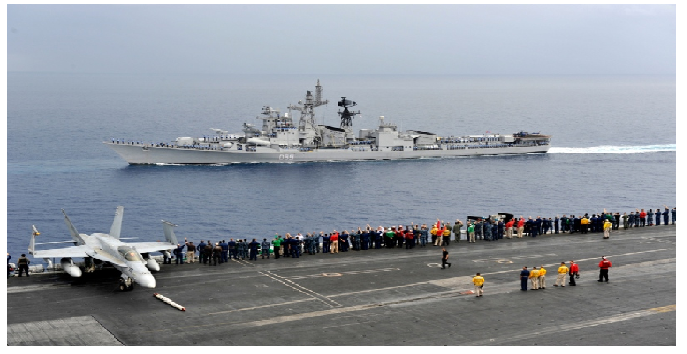The second edition of this years’ bi-annual Naval Commanders’ Conference was conducted at New Delhi from 26-28 Oct 15. Chief of the Naval Staff Admiral RK Dhowan chaired the conference and addressed the Navy’s top leadership on à host of issues including enhancing operational readiness of the Commands, infrastructure development, human resources management, coastal security, cyber security in the Indian Navy and foreign cooperation initiatives, amongst others.
Emphasising upon India’s geographic location and the prevailing security situation which demands continuous vigil and readiness to respond to any contingencies in our area of interest, the Admiral urged the Commanders’ to maintain highest combat readiness of our platforms and diligent monitoring of developments in the maritime domain.
 The Admiral lauded the efforts of the Navy for its focused action in deterring piracy attempts off the Gulf of Aden and closer to our islands in the Arabian Sea. Indian Navy’s presence and proactive operations in the area have instilled a sense of confidence in the shipping industry and has been a major contributory factor in the recent decision by CGPCS to shift the eastern limit of High Risk Area from 78 Degrees East to 65 Degrees East. He highlighted that not even one Indian owned ship has been hijacked since Oct 2008 due to the Indian Navy’s proactive anti-piracy stance.
The Admiral lauded the efforts of the Navy for its focused action in deterring piracy attempts off the Gulf of Aden and closer to our islands in the Arabian Sea. Indian Navy’s presence and proactive operations in the area have instilled a sense of confidence in the shipping industry and has been a major contributory factor in the recent decision by CGPCS to shift the eastern limit of High Risk Area from 78 Degrees East to 65 Degrees East. He highlighted that not even one Indian owned ship has been hijacked since Oct 2008 due to the Indian Navy’s proactive anti-piracy stance.
The Naval Commanders’ deliberated on the key technological enablers for transformation of the Navy. The CNS complimented the Commanders for good pace of modernisation with focus on ‘Indigenisation’ and urged continued and sustained efforts with progressive substitution of imports by ‘Make in India’. The Navy has been at the forefront of indigenisation with 47 ships currently under construction at Indian shipyards.
One of the focus areas discussed during the conference was the induction of manpower, aspects pertaining to training and skill development, and welfare of personnel. Consequent to 2015 being observed as the ‘Year of the Sailor’ in the Indian Navy, various aspects related to service conditions of sailors and their quality of life (including post retirement placements, accommodation and hospital facilities etc. for them and their next of kin) were deliberated extensively.
Deliberations were also held on infrastructure and manning requirements for new induction aircraft, including Unmanned Aerial Vehicles and enhancement of surveillance in our area of interest.
The CNS reviewed the ‘coastal security construct‘ and was satisfied with the steady progress made in strengthening the coastal security apparatus viz. induction of FICs, ISVs and NC3 I project.
In order to have a better understanding of the navies of the world and share best operational practices; the arrangements for the forthcoming mega event i.e. International Fleet Review (IFR) scheduled at Visakhapatnam in Feb 16 were also reviewed.
The Admiral also released the revised ‘Strategic Guidance to Transformation: A Passage Plan for the 21st Century’, a document which identifies the key enablers and taskings for transforming the Indian Navy to meet its growing role and operational responsibilities over the coming decades.

